Let me start by asking what kind of brain washing marketing has made us believe that doing something completely unsustainable, unhealthy and often ridiculous for 5 days of our entire lives will allow us to lose any excess body weight we have gained over the past 20-30-40 years, change all our bad habits and maintain these new supermodel bodies when we are allowed to return to normal life?!?
Amazing marketing, that’s what kind. The kind of marketing that is thought up by a laboratory of white coats who are ‘doctors of food’ with money to boot. Colourful posters, shiny packaging and skinny women drinking their shakes is all that is needed to top off the ultimate con.
I will resist the urge to debunk each individually (it would probably also render me liable) and instead provide the easier, cheaper, better, sustainable and smarter choice in my opinion. I will add however, that if you are thinking about swapping eating physical food for any kind of liquid replacement, if the replacement has words on the ingredient list that most biochemists probably could not pronounce OR instead of liquid, it comes in a pill - AVOID!
I was so sick of weight loss programs and diet plans that I felt the health and wellness industry needed a serious update.
What is DIET’s hip new cooler (and longer lasting) replacement called?
LIFESTYLE CHANGE.
And that is what we do in my Not Just Another Detox program.
The only complaint I get about this program?
There is so much food! But fact is, we need food, nutrients, protein and fat to effectively detox. Our bodies require these essential factors to do the job that they are created to do. And our body is created to effectively detox. We have excretory organs such as a liver, kidneys and our skin for this specific purpose.
So I hear you asking then, why do we even need to detox? The problem is, we are not putting the right nutrients in for our bodies to function optimally.
In today's fast food modern world much of what we are eating is not actually food, we're drinking liquids that do not hydrate our cells, breathing air that is becoming more and more polluted and turning our bodies into toxic dumping grounds from all of the products we use on our bodies and in our homes.
This hinders these natural processes in the body and we become unable to detoxify ourselves or mobilise fat. This has negative impacts on our hormones, body weight, mental health, fitness, immunity and overall general health. As a society, we are getting sicker, fatter and more fatigued and stressed than ever before.
Not Just Another Detox gives you the tools to change your environment, both internally and externally. It is not just a ‘diet’ or ‘detox’. It is not a checkup or service. It's a full over-haul!
The beauty of it as it can be done at your own pace. All you need to do is sign up, access the resources, get in the kitchen and read an email each day. What you do with the information, recipes and activities provided is totally up to you.
You will feel better, your body will work more effectively and your mind will be clearer even if you just change your eating habits for 2 weeks.
This program is not as easy as taking a pill or mixing up a food replacement chemical shake. But, trust me, it will change your life in much more significant and longer lasting ways than these quick fixes ever could.
Ready to cleanse and transform your life?
Click here and start today!
